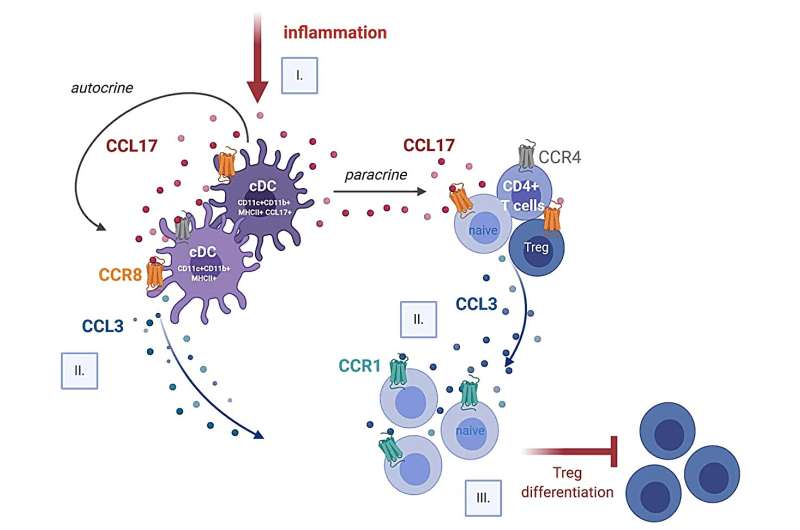This article has been reviewed according to Science X's editorial process and policies. Editors have highlighted the following attributes while ensuring the content's credibility:
fact-checked
peer-reviewed publication
trusted source
proofread
Researchers uncover new signaling pathway in the development of atherosclerosis

Atherosclerosis, a chronic inflammatory disease of the inner walls of blood vessels, is responsible for many cardiovascular conditions. Dendritic cells, which act to recognize foreign substances in the body and mount an immune response, play an important role in the disease. They produce the signaling protein CCL17, a chemokine, which influences the activity and mobility of T cells, which track down infected cells in the body and attack the pathogens. However, CCL17 can also promote cardiovascular pathologies.
People who suffer from cardiovascular diseases, or are particular susceptible to such diseases, have elevated levels of the signaling protein. In humans and mice, elevated CCL17 serum levels are associated with increased risk of atherosclerosis and inflammatory diseases of the cardiovascular and digestive systems.
However, scientists have not yet managed to establish how exactly CCL17 produced by the dendritic cells regulates the T cells.
A team led by LMU researchers Christian Weber and Yvonne Döring has demonstrated new mechanisms that are involved in the development of inflammatory cardiovascular diseases. Their study has just been published in the journal Nature Cardiovascular Research.
"We know from our previous work that a genetic deficiency or an antibody blockade of CCL17 impedes the progress of atherosclerosis," says Weber, Director of the Institute for Cardiovascular Prevention at University of Munich Hospital and one of the lead authors of the new paper.
Before now, only one signal receptor was known to contribute to the recruitment and functions of T cells. If this receptor is lacking, however, the body is not protected from the negative effects of CCL17, as Weber's team was able to demonstrate in a mouse study.
Mice that did not possess the receptor in question continued to have the same extent of disease driven by CCL17. If the signaling protein acted directly and exclusively on this receptor, then silencing it should have the same effects as the absence of CCL17.
Consequently, there must be another signaling pathway in which CCL17 is involved, and the researchers demonstrated and described just such a pathway in the course of the new study. "We furnish clear evidence that CCL17 acts through an alternative receptor with high affinity, thereby triggering a signaling pathway that results in the suppression of anti-inflammatory, so-called regulatory T cells," explains Weber's colleague and first author Döring.
These T cells would then no longer be able to tackle the vascular inflammations. By targeting and inhibiting individual receptors of the investigated signaling pathway in the course of their experiments, the authors were able to show that this mechanism plays a decisive role in the negative effects of CCL17.
Weber is convinced that this accomplishes a major step forward in the understanding of inflammatory diseases. "The reaction pathway we identified represents a highly relevant mechanism in chronic inflammatory diseases and could be an important starting point for a wide variety of therapeutic interventions."
More information: Yvonne Döring et al, Identification of a non-canonical chemokine-receptor pathway suppressing regulatory T cells to drive atherosclerosis, Nature Cardiovascular Research (2024). DOI: 10.1038/s44161-023-00413-9





















